Developments in Brief : Science Foundation Awards $1 Million to Speed Superconductivity Research
- Share via
The National Science Foundation, hoping to get a jump on foreign competition, is awarding $1 million to three research centers to accelerate investigation into new superconducting materials, so-called because they carry electricity with no resistance.
Superconductivity is a phenomenon by which electricity goes through a material with no energy loss from resistance. The condition occurs when materials are cooled to very low temperatures and molecular motion slows down.
If the process can be controlled and the right materials developed, superconductivity promises cheaper electrical power, faster and more efficient electronics and powerful magnets that can be used for everything from levitating high-speed trains to new generations of atom smashers.
The special grants are going to foundation-established materials research laboratories at Northwestern University, the University of Illinois at Urbana-Champaign and Stanford University.
The science foundation also has set aside $600,000 for “quick-start” grants to researchers with ideas on how to fashion the usually brittle semiconductor material into useful forms, such as rods, wires and ribbons.
The crash program is designed to keep the United States in the forefront of work on this promising technology as foreign competitors, particularly the Japanese, move rapidly to exploit it, the agency said.




